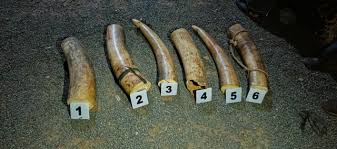 Elephant tusks in a past recovery
Elephant tusks in a past recovery
A suspected poacher has been arrested in Isiolo County after two elephant tusks valued at about Sh2 million were recovered in Kinna area.
Police and Kenya Wildlife Service (KWS) officers said they were acting on a tip-off when they intercepted the suspect on September 13, 2025. The tusks had been buried in a shallow trench, awaiting sale to a potential buyer.
Investigations suggest the tusks were removed from an elephant killed inside Meru National Park at an unknown date.
The suspect is being held in custody and is expected to be charged with being in possession of wildlife trophies of endangered species, contrary to Section 92(4) of the Wildlife Conservation and Management Act, 2013.
The latest seizure highlights the continued threat of poaching despite stringent measures to curb the trade. Elephant tusks remain highly sought after in the black market, particularly in Asian markets, where demand for ivory ornaments and traditional medicine fuels the illicit trade.
Kenya has over the years intensified its anti-poaching efforts, deploying advanced surveillance technologies such as drones, stepping up inter-agency collaboration, and enhancing community education.
These measures have yielded progress, including a historic milestone in 2020 when the country recorded zero rhino poaching cases for the first time in nearly two decades.
In a powerful anti-poaching statement in April 2016, Kenya set ablaze 105 tonnes of ivory and 1.35 tonnes of rhino horn, an event presided over by then President Uhuru Kenyatta alongside global conservation leaders.
While significant progress has been made, officials say Kenya remains a key transit hub for ivory trafficked from eastern and central Africa to Asia and the Middle East.
The continued arrests and seizures underscore the ongoing battle to protect elephants and safeguard the country’s wildlife heritage, which is central to its tourism industrt.












